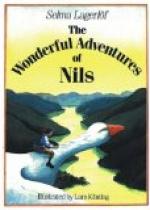“Now I think, Eric, that if the butterfly had dropped on land, it would soon have rotted and fallen apart. But since it fell into the sea, it was soaked through and through with lime, and became as hard as a stone. You know, of course, that we have found stones on the shore which were nothing but petrified worms. Now I believe that it went the same way with the big butterfly-body. I believe that it turned where it lay into a long, narrow mountain out in the East sea. Don’t you?”
He paused for a reply, and the other one nodded to him. “Go on, so I may hear what you are driving at,” said he.
“And mark you, Eric, that this very Oeland, upon which you and I live, is nothing else than the old butterfly-body. If one only thinks about it, one can observe that the island is a butterfly. Toward the north, the slender fore-body and the round head can be seen, and toward the south, one sees the back-body—which first broadens out, and then narrows to a sharp point.”
Here he paused once more and looked at his companion rather anxiously to see how he would take this assertion. But the young man kept on eating with the utmost calm, and nodded to him to continue.
“As soon as the butterfly had been changed into a limestone rock, many different kinds of seeds of herbs and trees came travelling with the winds, and wanted to take root on it. It was a long time before anything but sedge could grow there. Then came sheep sorrel, and the rock-rose and thorn-brush. But even to-day there is not so much growth on Alvaret, that the mountain is well covered, but it shines through here and there. And no one can think of ploughing and sowing up here, where the earth-crust is so thin. But if you will admit that Alvaret and the strongholds around it, are made of the butterfly-body, then you may well have the right to question where that land which lies beneath the strongholds came from.”
“Yes, it is just that,” said he who was eating. “That I should indeed like to know.”
“Well, you must remember that Oeland has lain in the sea for a good many years, and in the course of time all the things which tumble around with the waves—sea-weed and sand and clams—have gathered around it, and remained lying there. And then, stone and gravel have fallen down from both the eastern and western strongholds. In this way the island has acquired broad shores, where grain and flowers and trees can grow.
“Up here, on the hard butterfly-back, only sheep and cows and little horses go about. Only lapwings and plover live here, and there are no buildings except windmills and a few stone huts, where we shepherds crawl in. But down on the coast lie big villages and churches and parishes and fishing hamlets and a whole city.”
He looked questioningly at the other one. This one had finished his meal, and was tying the food-sack together. “I wonder where you will end with all this,” said he.




